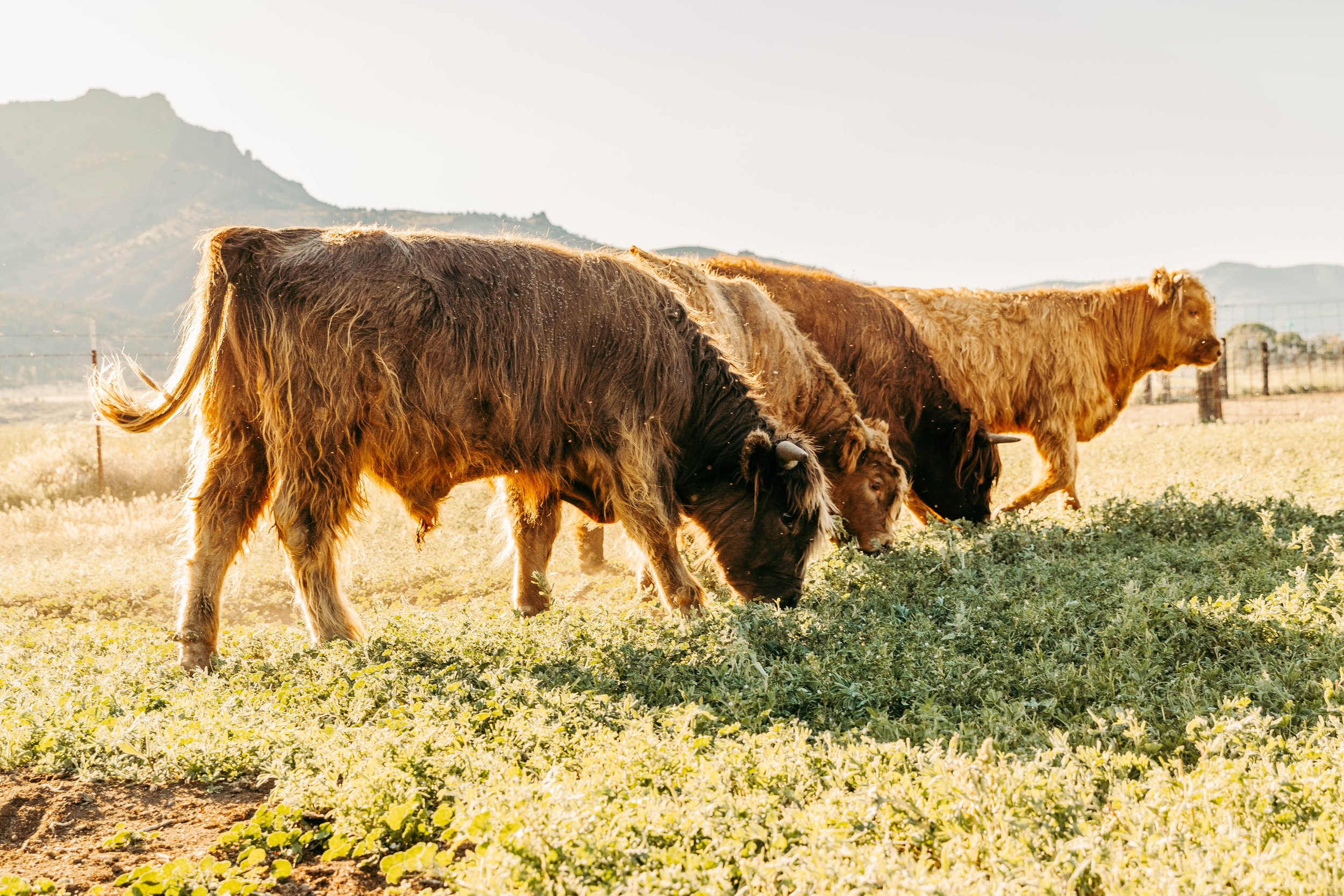Angus Beef
Our cattle spend their entire lives on our ranch. From birth to finish, they spend their time grazing the native grasses of the high desert as well as irrigated alfalfa and grass fields. They spend the first 6-8 months of their lives grazing next to their mom. At that point we like to fence line wean them. That means that they are separated from their mom by a fence. This mitigates stress levels because the calves are still able to smell and see their mom. This also creates less dust because they are on pasture, therefore reducing the risk of pneumonia or other respiratory illnesses.
After weaning the calves still spend time on grass growing. It isn’t until the last 180-200 days that they are fed a grain ration. They are fed a home-raised and milled barley diet, however when we are have run out of our own we like to locally source our own blend; a non-geo corn and barley mix. During this time these steers are still on grass and still offered unlimited access to alfalfa hay.
Highland Beef
We also have a herd of Highland cattle that we started in 2019. Highland cattle are one of the ultimate breeds of cattle that is known for their meat, fiber, and milk. How cool is that?
We love them and their demeanor. And their role on this ranch is to offer a grass finished meat option to our customers. They spend the entirety of their lives grazing the native grasses of the high desert as well as home-raised alfalfa and grass.
Dorper Sheep
On our ranch we have a small herd of dorper sheep. Dorpers are an exceptional meat breed but they are also what is considered a hair sheep. That means they will shed their hair/wool instead of needing to be sheared. And that alone was a huge win for me.
This flock of sheep is on pasture 100% of the time. They live with their guardian dogs, Daphne (Great Pyrenees) and Dolly (Registered Karakachan). During the summer months we like to move them around to different places around the ranch. This helps them to eat the grass as it comes up and helps us to manage the ground better to not have overgrowth.
Now pigs are something that I said I would never have. But what do you know.. one day they made their way home and my husband was setting up shelters for them, ha! Our pigs are not bred on the ranch, but they are sourced from family. Jon’s sister and brother in law raise such high quality hogs and are prop 12 certified. They are farrowed out with plenty of room and once they are at weaning age, they make their way to our ranch. Once at our ranch they are raised out on open pasture ground. This allows them the necessary space for growing. rooting the ground, and movement. Overall it just makes them a happier and healthier hog. Our hogs do not receive any vaccines, antibiotics, or growth hormones, just home-grown feed and sunshine. The hogs are grain finished for approximately 180 days.
These birds are sourced from reputable hatcheries and are shipped to our local post office. Once there, we take the 5 minute drive to go and pick them up. Once we get to the ranch, I have a brooder set up in the barn where they are secluded from the older hens and have a light on them. I keep them under lights for a few weeks until they start to get their adult feathers. After that, they are put into tractors where they have access to the grass and bugs 24/7. In these tractors, we move them every other day to help with ground management and offer them more feed. In addition to the pasture, these birds are also supplemented with fodder and fermented home raised feed.
Red Wattle Berkshire Hogs
Cornish Cross Poultry
Pasture-Raised Hens
Arreche Farms is home to a small flock of hens that live out their days rummaging through the irrigated pasture and hay stackyards. You can also find them throughout the barns and in the alfalfa fields looking for bugs and other critters.
These hens are fed a diet of home-raised and harvested grains as well as alfalfa. During the summer months, when it is not freezing temperatures, we also ferment their feed and offer fodder.
Ranch Horses
Our ranch is home to 5 horses, well.. 4 and 1/4 horses. Four Quarter horses: Jack (my first big horse that I bought in JR High) Rigs, Roanie and Sally. Fun fact, 3/4 horses are related and half siblings. We also have one miniature pony for the kiddos, Rita. The horses here on the ranch are used for poking through the cows and moving them from pasture to pasture as well as for recreational whenever this mama has some time.
Livestock Guardian Dogs
Our ranch is also home to three livestock guardian dogs. Dolly (registered Karakachan), Daphne (Great Pyrenees), and Gus (Registered Karakachan). These dogs live on the the ranch, two with the sheep and another up on the upper ranch protecting the livestock and us from predators.
Devil’s Garden Burros
Okay, why the heck do we have a couple of burros here? Well for protection of course! We do have a high predator load here. We see a lot of coyotes running around lately and they can wreak havoc on a calving season. So we got these two boys from the Devil’s Garden roundup and they will be acquainted with their herd. They will live with the cows and hopefully help the cows to fend off any coyote attacks.
But, they’re adorable and their names are Darrel and Darren.









